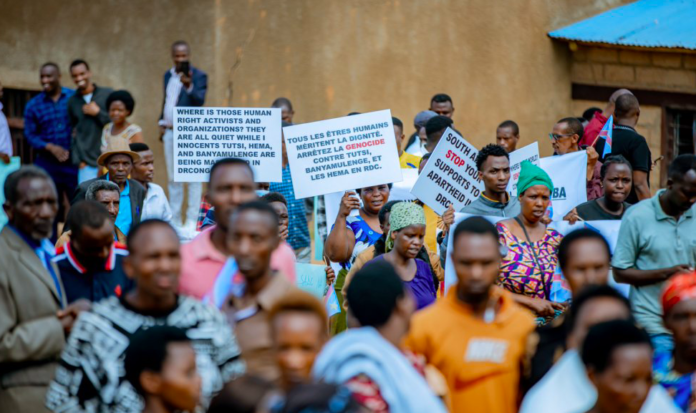On March 4, 2024, a notable event unfolded within the borders of Rwanda, centering around the Congolese Tutsi refugees housed across various camps in the nation. Initiated in the Nkamira camp, located in the Rubavu district, the refugees embarked on a peaceful march. This demonstration, devoid of any security presence—a detail that veers from the norm in Rwanda’s tightly controlled public gathering landscape—was aimed at voicing discontent against the ongoing violence targeting Kinyarwanda-speaking communities in the Democratic Republic of Congo (DRC).
The march, unprecedented in its lack of official sanction from Rwandan authorities, raised eyebrows given the country’s stringent policies on public demonstrations. The absence of formal approval highlighted a potential underlying involvement or tacit endorsement by the Rwandan government, suggesting an unusual deviation from the standard procedural requirements.
Protesters, wielding signs in both English and Kinyarwanda, vehemently condemned the genocide being perpetrated against Tutsis in the North and South Kivu regions, as well as Ituri in the DRC. They also criticized Malawi’s alleged support of these atrocities. Beyond the march, the refugees utilized art to express their despair and exhaustion over the relentless violence.
This series of protests, commencing on March 4, is slated to continue across various camps in Rwanda, ultimately culminating in Kigali. There, further actions, including engagements with selected embassies, are expected. This movement echoes a previous demonstration in March 2018 at the Kiziba camp, which met with a violent crackdown by Rwandan forces, resulting in the death of at least 20 refugees, injuries to many, and subsequent arrests and trials, according to United Nations reports.
Analysts posit that the Rwandan government might be orchestrating these protests in response to international demonstrations supporting the Congolese government. This theory suggests a strategic manipulation of refugees by the Rwandan authorities, capitalizing on their plight to serve political and diplomatic ends, in a context where dissent is closely monitored and generally aligned with governmental interests.
A Congolese Tutsi refugee, previously residing in the Kiziba camp and now based in the United States, lambasted the Rwandan government’s initiative to mobilize the refugees, labeling it as demeaning and humiliating. This sentiment underscores a perceived cynical use of refugees as political and diplomatic tools, revealing a complex layer of geopolitical maneuvering that utilizes human suffering as a bargaining chip in the broader regional dynamics.































































